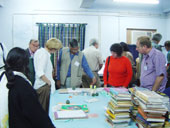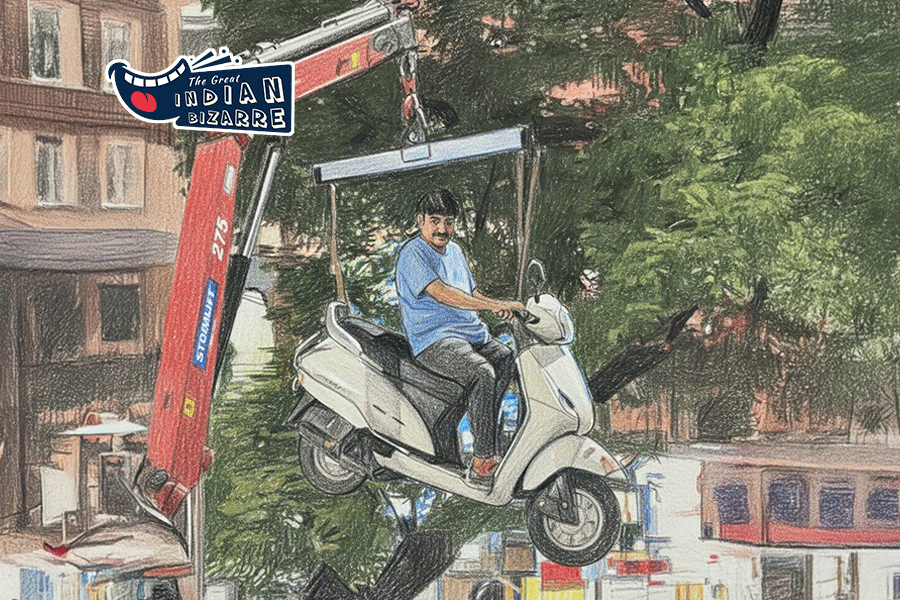 |
| BOOK TALK: Sukanta Chaudhuri (third from left) with participants at one of the international conferences held recently at Jadavpur University |
It all started with four tin trunks, coloured silver and crammed with a treasure rarer than gold. The value of the yellowing pages of the unpublished, private papers of eminent modernist poet Sudhindranath Datta and his wife, singer and musicologist Rajeshwari Datta, was clear to those who knew their literature. And among those clearly excited by the sheaf of old pages was Sukanta Chaudhuri, a scholar who had for some time been pondering on the need for salvaging and preserving ? with the help of digital technology ? the unpublished works of renowned authors, especially those who wrote in Bengali.
“There is a vast body of unpublished written work by distinguished authors, which is in danger of being lost forever unless something is done to preserve them,” says the professor of English at Jadavpur University (JU). The papers exist in myriad forms in diaries, notebooks or even bits and pieces of loose sheets of paper. They are mostly hand-written in ink that fades with time, and on paper that rots with each passing day. “Most of this written work, while in the safe keeping of family, friends, relatives or other private collectors, is treated with the utmost care. But nevertheless, it is subject to a natural course of decay,” says Chaudhuri.
Sudhindranath, in fact, was known to have used a special Chinese ink which was acidic and corrosive, and caused paper to tear easily. But it helped that the Dattas had donated the body of their unpublished works to JU, with which they had a long and close association during their lifetime. Work on preserving their writings could, therefore, begin without a problem. And copyright was not an issue.
Sitting in his office at the far end of a long and winding corridor on the third floor of JU’s Arts Building, which houses the School of Cultural Texts and Records (SCTR) ? as the project has come to be known ? Chaudhuri recalls the days when it was still in its nascent stages.
It was in the August of 2003 that the project got rolling. But unlike the Datta papers, which virtually landed in SCTR’s lap, other manuscripts initially didn’t come crawling out of the woodwork.
“Not too many people knew about the existence of the school,” explains Chaudhuri. But the message spread ? and mainly through word of mouth. Authors’ families and friends were requested to help the school locate works that could be salvaged.
In 2004, Chaudhuri and Swapan Majumdar, professor of comparative literature at JU and head of the ‘Sudhindranath ? Rajeshwari Datta’ project at the school, approached the late poet’s relatives for his papers. Sudhindranath had willed all his movable and immovable property to JU, to come into effect only after the death of his wife. However, after Rajeshwari died in 1976, the papers were divided up and kept in relatives’ houses under a trust in the name of Sudhindranath’s father ? the Hirendranath Datta Memorial Trust.
Many of the writings were handed over to JU, but Majumdar says that some papers are still with relatives. The JU collection spans some four decades from his early writing in the 1920s up to the time of his death in 1960. “These include many unpublished short stories written in Bengali, as well as some works in English,” says Majumdar.
Damayanti Basu Singh narrates the sequence of events which finally convinced her to hand over the manuscripts of her father, the eminent author, Buddhadeva Bose, to the school. “I knew Sukanta and trusted him. I primarily agreed because it was he who approached me.”
The poet’s family had one condition ? it didn’t want the manuscripts to leave their house. “So it was decided that someone would come to my house with a portable scanner and make the copies,” she says. “But finally, because the process was too slow, we allowed them to take away four or five manuscript copies at a time.”
Today, Basu Singh is happy at the work that JU’s taken on. “I think the school is doing excellent work in trying to retrieve the manuscripts of authors such as my father, who live on through their work beyond their time.”
Which is possibly why, when Meenakshi Chattopadhyay, widow of poet Shakti Chattopadhyay, was faced with a dilemma about whether to donate his manuscripts to the school, Basu Singh encouraged her. “I urged her to go ahead.”
But the project called for money, since the process of restoring works was expensive. Digital preservation entails the use of costly equipment such as scanners and preserving a document ? an author’s diary, notebook or manuscript ? means keeping a scanned, digitalised image of each and every page. Says Chaudhuri, “We try not to exclude even a single page of a document or manuscript. The final dimension of the project is to gather the material records of India’s cultural civilisation.”
Money started coming in after JU became a beneficiary of the University Grants Commission’s “University with Potential for Excellence” scheme. Funds were used for the project, and today the school has earned for itself the distinction of being seen as a pioneer in textology.
Testimony to that is the fact that the globally respected Society for the History of Authorship, Reading and Publishers chose JU as the venue for this year’s Asia-Pacific Regional Conference, which was held in the city last month, following a general conference on textual matters. “It was a rare honour,” exclaims Chaudhuri.
The prestige conferred is not surprising. Consider the types of pioneering studies conducted at the school. The Sylheti-Nagri Script project, headed by Anuradha Chanda, for instance, has acquired 47 of the 122 texts known to exist in this obsolete script from field trips to remote regions of Cachar/Sylhet in Bangladesh. A software ? called ‘Tafat’ or ‘The Difference’ ? has been invented by IITian Siddhartha Chaudhuri for a project of computer collation ? that is, the comparison of different editions ? of Tagore’s works.
Among the most successful projects is the school’s Archives of North Indian Classical Music. Says Professor Amlan Das Gupta, who spearheaded the project, “My own interest in Hindustani classical music is what triggered the idea of creating an archive of this nature. The plan is to make it accessible to the public.”
The originals are, almost without exception, from private collections, recorded at concerts and soirees and never commercially circulated. Says Das Gupta, “I find that those who own them are not at all reluctant to have them digitised. In fact, I have never had to ask anyone twice.” Recently the archive has received material from author Gour Kishore Ghosh’s family.
But clearly preserving is not the school’s only agenda. Publishing also features high on its list of priorities. Says Chaudhuri, “We hope ourwork with the manuscripts of these three major poets ? Bose, Chatterjee and Datta ? will serve as a prelude to collating, editing and publishing manuscripts and private papers of other poets and writers of Bengal.” And the written word will live on.











